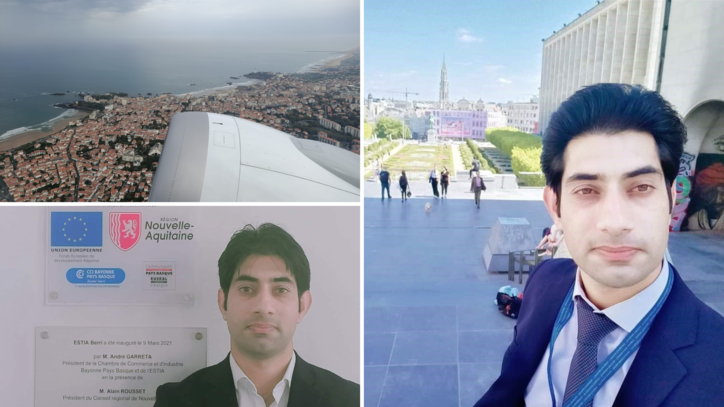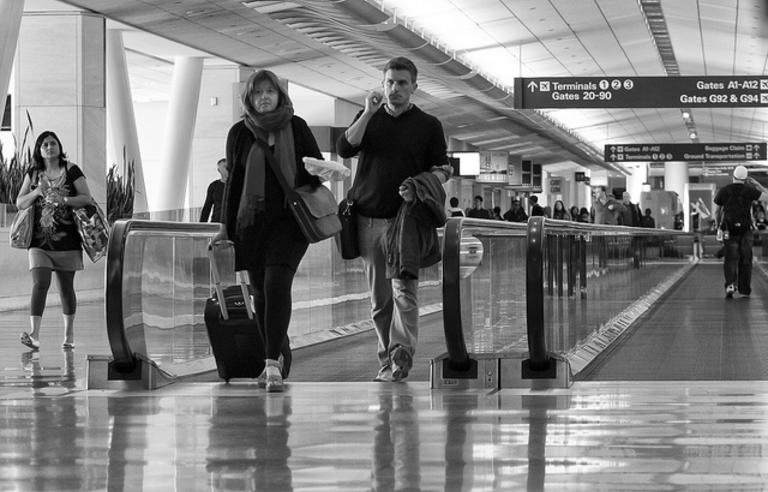
France Excellence Research Residency - Alumni Story
Are you curious to know how would a mobility grant to France impact a researcher's work?
Read about Dr. Muhammad Zahid Iqbal's mobility to France, financed by the France Excellence Research Residency grant (formerly known as the French Research Residency grant) below!
Dr. Muhammad Zahid Iqbal was among the laureates of the 2022 France Excellence Research Residency grant (formerly known as the French Research Residency grant). He travelled to ESTIA: Ecole Supérieure des Technologies Industrielles in Bidart near Biarritz for his research on immersive technology (VR/AR) and intelligent agents for STEM education and training.
He is now a Lecturer/Assistant Professor in Immersive Technologies at Teesside University in the United Kingdom.
What motivated you to travel to France for your research? What were your expectations?
To apply for a research residency in France, I considered several factors linked to the future of my career in academia. The first thing is academic excellence, France has long-standing academic excellence and is home to several world-renowned research institutions with state-of-the-art facilities. Secondly, France offers a wide range of research and collaboration opportunities in science, engineering, and especially in computer science. I applied to the French Research Residency to find research collaborations, networking, and funding opportunities. France encourages interdisciplinary research, fostering collaborations between different fields of study. This interdisciplinary approach can appeal to researchers looking to explore diverse research areas.
The third major reason for my interest in France is the rich culture, living standards, weather, and opportunities to meet people of diverse backgrounds. France offers a high quality of life, with a rich cultural scene, beautiful landscapes, and a well-developed public transportation system. Living in France can provide researchers with a rewarding and enriching experience beyond their academic pursuits.
Could you describe your life in France?
During my stay in France, I worked in Bidart at ESTIA: Ecole Supérieure des Technologies Industrielles and lived in Biarritz. Bidart is a beautiful coastal town located in southwestern France, near the tourist destination of Biarritz and which offers a charming and relaxed lifestyle. Biarritz has beautiful sandy beaches and a coastal lifestyle, making it a paradise and water sports enthusiasts. Surfing is particularly popular in Biarritz due to its excellent waves. The surroundings offer breathtaking views of Basque Country landscapes.
The region offers a rich culinary experience focusing on fresh seafood, Basque specialities, and local produce. Residents can savor delicious meals in various restaurants and cafes. Bidart maintains a laid-back and friendly atmosphere, making it a peaceful place to live. It is less crowded than neighboring Biarritz, offering a more tranquil environment.
How did your research project go with your French partners?
During my 20 days of stay, I found many potential areas for collaboration and academic interests, which I planned to start with the cooperation of French researchers. I found more interesting options to work as a multi-disciplinary researcher. As ESTIA is an engineering school, it helped me to learn about the opportunities to integrate immersive technology in engineering education and industry. Currently, I am working on cyber-physical systems and digital twining, which heavily focuses on the engineering and industrial use of augmented and virtual reality.
Has this experience been valuable to you? Professionally and personally?
Yes, of course, this was a fantastic experience to learn about the French research culture, the academic community, and funding opportunities. Interaction with researchers from different backgrounds has exposed me to new viewpoints, methodologies, and innovative ideas. Living and working in a foreign country is always challenging, and I learned to adapt to new environments and cultures. Observing the work-life balance of French researchers offers alternative perspectives to balance productivity with personal well-being.
Are you planning on going back to France for your research?
Returning to a place of positive experience can bring a sense of personal fulfilment and satisfaction. The fond memories can contribute to a positive work environment and mindset. Currently, I am working as an Assistant professor in immersive technologies at Teesside University, UK, and I will definitely look for visiting research opportunities to research and collaborate with French researchers. I would always like to take such opportunities in the summer because of free time for research and having a beautiful life in French coastal areas.
If you could describe your trip with one memory, what would it be?
Of course, the best memory differs for each researcher based on their field, interests, and the experiences they encounter during their research visit to France. One of the best things I have learned during this research is that France has numerous research opportunities with a welcoming environment, and there are amazing places to spend summer in France. Academic culture is friendly and provides opportunities to grow for research excellence.
Is there any advice that you would like to give to applicants and/or laureates of the French Research Residency mobility grant?
If you are considering applying for the French Research Residency mobility grant, this is a great opportunity to further your research and academic pursuits in France.
You should understand the objectives of this funding and eligibility criteria and find a suitable host according to your research interests. Make sure you meet all the requirements before applying. Aligning your research project with the French research landscape can strengthen your application.
Once awarded the grant, plan your research residency well in advance. Arrange accommodation with Campus France, travel, and other logistics in coordination with the host institution in France. Embrace the opportunity to experience French culture and immerse yourself in the local community. Engage with fellow researchers and attend seminars and workshops to broaden your knowledge.
After the residency, maintain communication with your French colleagues and collaborators. Networking is essential for ongoing collaborations and potential future opportunities.
Remember, the French Research Residency is not just financial support but also an opportunity for personal and academic growth. Make the most of this experience to advance your research career. Good luck!














